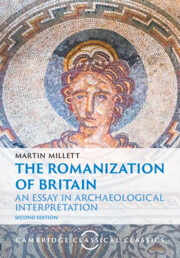Book contents
- Frontmatter
- Dedication
- Contents
- Illustrations
- Tables
- Foreword
- Preface
- Introduction: The Romanization of Britain in perspective
- 1 The Nature of Roman Imperialism
- 2 The Pattern of Later Iron Age Societies
- 3 The Invasion Strategy and Its Consequences
- 4 The Emergence of the ‘Civitates’
- 5 The Maturity of the ‘Civitates’
- 6 Development at The Periphery
- 7 The Developed Economy
- 8 Later Roman Rural Development
- 9 Epilogue: Decline and Fall?
- References
- Index
Introduction: The Romanization of Britain in perspective
Published online by Cambridge University Press: 02 January 2025
- Frontmatter
- Dedication
- Contents
- Illustrations
- Tables
- Foreword
- Preface
- Introduction: The Romanization of Britain in perspective
- 1 The Nature of Roman Imperialism
- 2 The Pattern of Later Iron Age Societies
- 3 The Invasion Strategy and Its Consequences
- 4 The Emergence of the ‘Civitates’
- 5 The Maturity of the ‘Civitates’
- 6 Development at The Periphery
- 7 The Developed Economy
- 8 Later Roman Rural Development
- 9 Epilogue: Decline and Fall?
- References
- Index
Summary
As I sit down to write this introduction it is difficult to appreciate that writing the original text of The Romanization of Britain (henceforth RoB) was completed (in my attic in Durham) a professional lifetime ago – the manuscript being completed in July 1988. In this introduction, I want to reflect on the context within which that book was written, then discuss some of the responses to it, before offering a few thoughts on the current state of studies of Roman Britain (and the provinces more broadly). I will not, however, enter into a prolonged discussion of current thinking about cultural change under Roman hegemony. Before embarking on this, I would like to digress with two observations. First, over the ensuing thirty-five years, I have occasionally been asked why I have not written a new edition of RoB in order to bring the text up to date. My answer has always been that the original book was very much a product of its time and was conceived of, as its subtitle proclaims, as ’an essay’. As such, although aspects of the evidence presented should indeed be updated, the essence of the book was conceived of as a connected narrative, so any updating or revision would carry the danger of blunting its argument. Further, it was a product of my thinking at a particular point in time, so it should remain as such and be read in that context.
- Type
- Chapter
- Information
- The Romanization of BritainAn Essay in Archaeological Interpretation, pp. xix - xxxviPublisher: Cambridge University PressPrint publication year: 2025

